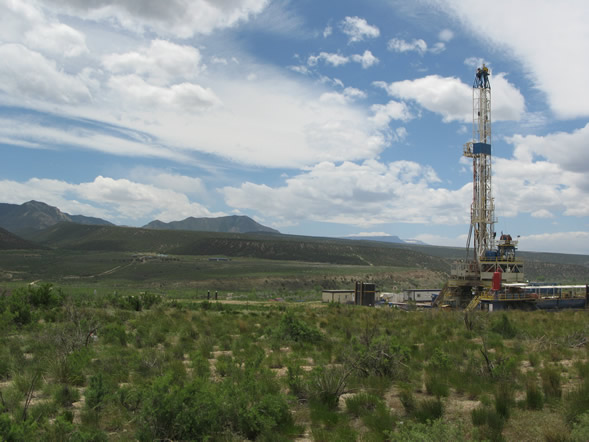Widgetized Section
Go to Admin » Appearance » Widgets » and move Gabfire Widget: Social into that MastheadOverlay zone
EPA to hold Denver hearing on rules to cut methane emissions in oil and gas drilling

The EPA will hold a hearing in Denver on Wednesday to take public input on its proposed oil and gas methane rules.
Editor’s note: A version of this story first appeared in The Colorado Statesman:
More than 100 environmentalists, oil and gas industry representatives and members of the public have signed up to testify this week during a U.S. Environmental Protection Agency hearing in Denver on proposed rules to reduce methane and other emissions during oil and gas production.
The federal rules mirror those adopted by the Colorado Air Quality and Control Commission in early 2014 and approved by the state legislature in 2015, making Colorado the first state in the nation to regulate methane emissions by the oil and gas industry.
Methane, the main component of natural gas, is 25 times more potent as a greenhouse gas than carbon dioxide. Colorado’s methane rules compel industry to seek out and stop methane leaks and install equipment to capture 95 percent of methane and volatile organic compounds.
In a statement last month when the EPA first announced its proposed rules, Gov. John Hickenlooper said the state anticipates the federal policy “will complement and not interfere with steps Colorado has already taken in striking a balance between the state’s need for a healthy oil and gas industry and resident concern about health, safety and the environment.”
He added that Colorado’s rule resulted from “tough discussions” between industry, environmentalists and other stakeholders.
“In Colorado, protecting public health and the environment, and promoting our energy industry are not mutually exclusive endeavors,” Hickenlooper said.
The EPA estimates its new rules will reduce methane emissions by up to 400,000 short tons by the year 2025, which is the equivalent of reducing emissions of carbon dioxide by up to 9 million metric tons.
However, oil and gas industry representatives say they are already working hard to reduce methane emissions during drilling operations, as well during transmission, gathering and processing of oil and gas, and that the new federal rules would be unnecessarily burdensome.
“In Colorado, as in other parts of the country, the industry was already introducing technologies such as reduced emissions completions, which cut methane leakage when a well is brought into production,” said Tracee Bentley, executive director of the Colorado Petroleum Council.
“Additional regulations are not necessary and could have a chilling effect on the American energy renaissance, our economy, and our national security,” Bentley added.
Dan Grossman, Rocky Mountain regional director of the Environmental Defense Fund in Boulder, says inefficiency in the oil and gas industry wastes 7 million tons of methane a year, which undercuts industry arguments that they already are incentivized to capture the gas.
“It’s a bit of a tired argument, but the truth of the matter is that industry’s not a monolith,” said Grossman, a former state legislator. “There are operators out there that are incredibly diligent, that go above and beyond what regulations require with regards to mitigating pollution, and there are some operators that don’t. It’s really important to have a level regulatory playing field.”
The EPA currently does not regulate methane emissions from the nation’s natural gas processing infrastructure, which researchers at Colorado State University say are the largest source of industrial methane emissions in the country.
In a recent study, CSU researchers found that “these emissions are equivalent to the amount of natural gas consumed annually by 3.2 million U.S. homes and represent a potential loss of $390 million in revenue to producers.”
But Grossman counters that “regardless of the price of the commodities of oil and gas, it’s important to remember that this is an asset for industry and it’s also a pollutant. I don’t think that we can rely on market forces as a substitute to strong regulations.”
CPC’s Bentley, a former Hickenlooper administration legislative director and senior advisor on energy and agricultural issues, pointed to a statement from the CPC’s parent organization, the American Petroleum Institute:
“The last thing we need is more duplicative and costly regulation that could increase the cost of energy for Americans. Even as oil and natural gas production has surged, methane emissions from hydraulically fractured natural gas wells have fallen nearly 79 percent since 2005,” API states.
However, Grossman says that multiple studies show that for one penny per Mcf (1,000 cubic feet) of gas produced, operators can reduce methane emissions by as much as 40 percent.
“We think that is a worthwhile investment on the part of operators and you can’t get a better bang for your buck with regard to pollution control,” he said.
Colorado in 2010 gave the legislative nod to natural gas over coal with the passage of the Clean Air, Clean Jobs Act, acknowledging that natural gas is 50 percent cleaner than coal in terms of greenhouse gas emissions when it’s used to produce electricity. But that advantage declines significantly when methane emissions are factored in, according to Grossman.
“What the studies tell us is that unless you really require more efficiency in the production, transmission and storage of natural gas, you could lose the climate benefit of burning natural gas as a fuel source,” Grossman said.
The hearing will be held from 9 a.m. to 8 p.m., Wednesday, Sept. 23 at the EPA Region 8 Office at 1595 Wynkoop Street in Denver. Everyone attending the hearing will be required to pre-register and show valid picture ID to enter the building.
Interested parties can also comment by email, fax or letter for 60 days after the proposed rules are published in the Federal Register. For more information on the proposed rules and submitting written comments: http://www.epa.gov/airquality/oilandgas/actions.html


